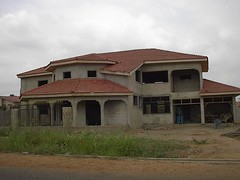Home Economics
The Wife and I have been thinking of buying a house for the past year and, since spring, have been mostly bemused at the huhudious prices that were being quoted to us (with straight faces, mind you) for mostly depression era houses. Thus we've been getting an education on the hard sell during our few months of attending open houses, and also some lessons in home economics.
The New Mathematics
After last week's action, some new mathematics is in effect. We have the following equation:
Maximum prudent ™ house price = $521,250 = $417,000 (maximum federally-insured mortgage) + 20% downpayment
Note: prudent ™ denotes a conforming loan and home financing deal that wouldn't raise the eyebrows of even the staidest banker.
Note: the days of 20 percent downpayment have been out of fashion for a long time (we live in a subprime era) so we'll relax our stringent banker conservatism and use a 10 percent downpayment as our baseline. This reduces the maximum prudent house price to $463,333.
Note: the conforming loan limit of $417,000 is the maximum federally-insured mortgage above which point we are in the realm of jumbo mortgages which have all of a sudden become quite scarce.
Voodoo Economics
The median price of housing listed in the Bay Area was said to be $785,380 in February 2007 when we started looking in earnest. That was the listing price and not necessarily the sale price but, regardless, that was sticker shock by any definition.
In June 2007, the median housing price paid in the Bay Area was $665,000, a new peak. See also a trend graph of an earlier data set.
The typical monthly mortgage payment in the Bay Area was $3,219. "adjusted for inflation, current payments are 24.0 percent above typical payments in the spring of 1989, the peak of the prior real estate cycle." Jumbo mortgages "represented 62 percent of the purchase loans" made in the area.
Jumbo Jitters
Putting these things together, it is clear that something does not compute. The force of gravity will make itself felt and the $200,000 gap - the fat on which the housing sector in the Bay Area has been feasting on for the past 15 years - will of necessity be closed. The only questions are how much the gap will narrow and how long it will take.
The typical price of the only reasonable houses we have seen during our search was $750,000 (The Wife has called much of the rogues gallery that were shown to us "illegal dwellings"). We thought we'd seen an overheated market in Boston but the Bay Area has redefined our perceptions on that front. A software engineer and history professor ought to be able to afford a starter house.
The hard sell and the real estate shell game was in earnest and it was as if the whole town was in on the con. The pinnacle was the university housing officer who advised her academic client that we could easily afford a $700-800,000 mortgage - if you ran the numbers, monthly housing payments (circa $5,000) would far exceed the salaries of most academics which prompted said academic's quip "I'm not going to spend that much on a depression era bungalow" to the surprisingly-shocked agent. I suppose I would have put it as the Emperor has no teeth.
Even if we could afford such imprudent things we'd rather spend our money traveling to more congenial settings, we are modern travelers and exiled souls after all. The funny thing is that if you spend enough time talking about housing in the Bay Area, you could almost convince yourself that everything was normal. Nobody blinked in conversation; the stratospheric prices were just the way things were — indeed it was so surreal and you could very easily allow yourself to be bamboozled — there was a week where we almost succumbed. Almost...
There's lots of moral hazard in the mounting chorus to bail out the fiscal wizards. Many are lobbying for the limits on Fannie Mae and the like to be lifted or for interest rates to be cut. Sidenote: the language of financial panics is always interesting: credit crunch, mortgage meltdowns, debacles etc. Fed chairman Ben Bernanke has been known for his "cautious experiments" in the past and will surely come up with some kind of intervention. When well-heeled bankers start invoking the spectre of millions out on the street you can almost hear the subliminal "think about the children" message. John Kenneth Galbraith is sorely missed.
In any case, we continue to search for a home... For the first time last week, we saw advertised a condo in a nice neighbourhood that was priced under the new mathematics at $469,000 - some sellers obviously need to cash out quickly (similar houses were priced at $650,000 just a few months ago). Hopefully we'll start seeing more of these things and it might even become a buyer's market. I won't hold my breath however; there's a surplus of unreality in the Bay Area.
In closing I'll note that Ikea was packed last weekend — everybody is doing home improvement, it seems. I don't think much of it was about putting a shine on show houses that you needed to flip ("one last try"), rather I suspect that it was belt-tightening at work, and making do with what you have. Time will tell and we'll be waiting this one out in our rented nest.
A Subprime Playlist
Some music for those inclined to home economics...
- Dionne Warwick - A House Is Not A Home
Dionne really came into her own when she sang the Burt Baccarach songbook. It was a sublime case of pathos, operatic pop as it were featuring Baccarach's lyricism distilled in that delicate voice. All her later monetary triumphs stemmed from the magic of those wonderful interpretations. - Kool Moe Dee - They Want Money
I was going to pick Money Jungle by Duke Ellington, Charlie Mingus and Max Roach for this playlist - the song (and album) is suitably jarring and tense, but I thought that Kool Moe Dee would be more appropriate. The title of the album is a key indicator: Knowledge is King. Laymen are always the last to get bailouts hence education is key to prepare for the periodic shocks of the grifter impulse. They Want Money is the soundtrack for Jim Cramer's crew, its blaring horns an ode to Alan Greenspan's politically expedient teaser rates, its rapid-fire lyrics are dedicated, with respect, to all those who have been selling a bill of irresponsible goods in the housing market. - Simply Red - Money's Too Tight To Mention
Social commentary of hard times and explicit lyrical harkening to Reaganomics. Mick Hucknell saw the darker side of trickle down economics and told it like it was. There are of course thousands of "no money" blues but when rendered in this pop vein, never have they been so upbeat or danceable. Perhaps one should also mention here Money to Burn by Wrinkars Experience in the reggae vein and round things off with the Wu-Tang Clan's C.R.E.A.M. ("Cash rules everything around me, cream get the money, dollar, dollar bill y'all") - Luther Vandross - A House Is Not A Home
I really need to do an appreciation piece on Luther who, like Aretha, had the uncanny ability to make any song his own. Simply put, his version is the definitive version - it's not even close. Soul music with all the accoutrements, lush and emotional.
A house is not a home, how true.
File under: economics, housing, mortgage, Bay Area, California, Berkeley, observation, home, money, finance, bubble, debt, subprime, shell game, USA, toli





4 comments:
Brother Koranteng,
Home is Anywhere You Hang Your Head. As for me, I live in a violin..
I dig the hipster suggestions (you made my morning)... Let me add another in the same vein to the playlist:
Wherever I lay my hat that's my home - both the Marvin Gaye original and the Paul Young version (in some ways I even prefer the latter version even if Marvin was the original merchant of hip).
Keep renting! The housing market here is upside down. Take Albany. You can rent a house there for 1500 & up, but a house will cost you > $600k. I rent a nice apartment by Lake Merritt for < $1200. Any condo in this area will go for > $300k, and the houses (they are large) are around $1m. The Lake Merrit area, btw, is a nice location for commuting to Berkeley or SF (or downtown Oakland). Anyhow, best of luck.
Absolutely Erik, we're quite happy renting - it's just that we, the Royal we, were sold on the notion of home-ownership. It's one of those things you were supposed to check off the list, the American dream or something. A dream deferred and all that...
And yep, Lake Merrit is very nice - tempting even though we lucked into a nice part of Berkeley.
Post a Comment